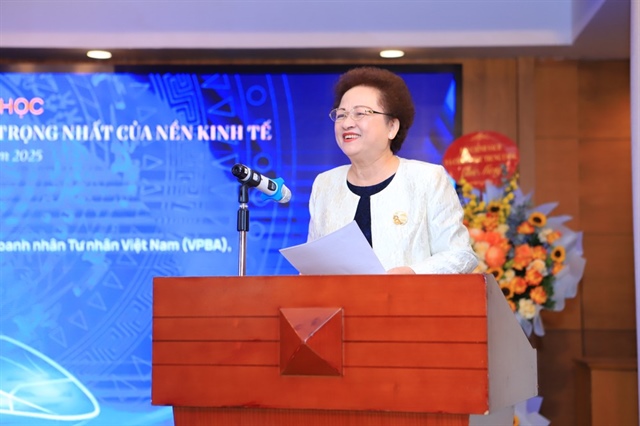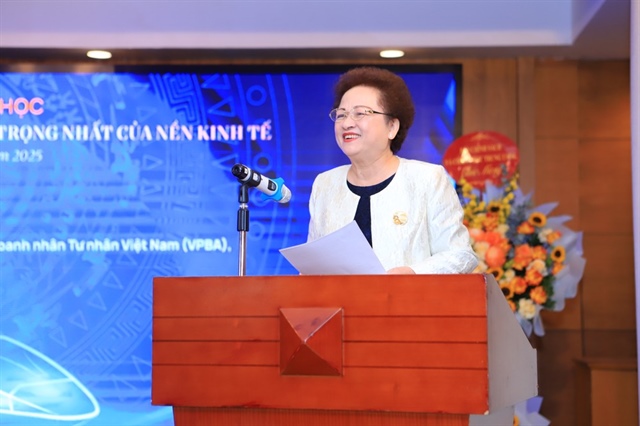On May 26, the Vietnamese Private Business Association (VPBA) organized a workshop with the theme “Private Sector as the Most Important Driving Force of the Economy.”
Comprehensive Implementation of Resolution 1 is Essential
As a prominent private economic group with a vast workforce and over 30 years of experience, Ms. Nguyen Thi Nga, Vice Chairwoman of VPBA and Chairwoman of BRG Group, expressed her delight and excitement about the innovative and groundbreaking ideas presented in Resolution 68 by the Political Bureau.
The resolution offers a realistic assessment of the private sector, acknowledging its significant contributions while also addressing existing challenges, root causes, and potential solutions.

Ms. Nguyen Thi Nga emphasized the need for a systematic approach to implementing Resolution 68, providing private enterprises with a sense of security to confidently invest in their development. Photo: MINH TRÚC |
However, Ms. Nga pointed out that the institutionalization of Resolution 68 requires a well-structured implementation plan to ensure that it translates into tangible actions. This will enable entrepreneurs to confidently invest in their business growth, accumulate wealth legitimately, and actively contribute to the country’s overall development.
Mr. Dau Anh Tuan, Vice Secretary General and Head of the Legal Department of the Vietnam Chamber of Commerce and Industry (VCCI), shared that immediately after the issuance of Resolutions 66 and 68, VCCI initiated a review of existing obstacles and proposed amendments to the government.
According to Mr. Tuan, private enterprises investing in land-use projects face a complex web of procedures, including master and detailed planning, investment policy approval, investor selection, land-related processes, and land leasing, to name a few. There are at least 15 primary procedures and numerous smaller steps, many of which can be streamlined and improved upon.
Therefore, Mr. Tuan emphasized that businesses need a reformed process that facilitates their operations and enables smarter management.
“In addition to the breakthrough spirit of Resolution 68, concrete actions from the National Assembly and the Government are crucial. There is a need for bold reforms to ensure a swift flow of capital into the economy,” asserted Mr. Dau Anh Tuan.
Resistance to Change Will Lead to Business Elimination
During the workshop’s discussion session, Mr. Phan Duc Hieu, a member of the 15th National Assembly and a permanent member of the National Assembly’s Economic and Financial Committee, emphasized the importance of a strong partnership between the state and the private sector to effectively implement the resolution.
Mr. Phan Duc Hieu asserted that the private sector can truly transform from a “supporting” role to the “most important driving force of the economy” when there is a synchronized improvement in the institutional and policy environment. Simultaneously, businesses must enhance their governance, productivity, and innovation capabilities.
He explained that previously, complex procedures acted as a “shield” protecting enterprises from competition. However, with simplified procedures, capable young investors will enter the market, intensifying competition.

“Resistance to change and failure to improve capabilities will lead to business elimination,” said Mr. Phan Duc Hieu, a member of the 15th National Assembly and a permanent member of the National Assembly’s Economic and Financial Committee.
|
Previously, businesses were shielded by regulatory protectionism, but now they are more vulnerable. Hence, those who resist reform and fail to enhance their competitive capabilities will be left behind.
Mr. Hieu also highlighted the critical role of business associations as an essential “link” between the state and the business community. These associations should not only represent the voice of businesses but also proactively engage in policy criticism, propose solutions, and support members in improving their governance, market access, and technology adoption.
“A robust private sector relies on a strong, professional, and leading business association system,” Mr. Hieu affirmed.
Creating a Broad Avenue for Businesses to Soar
Dr. Le Xuan Nghia, a member of the National Financial and Monetary Policy Advisory Council, shared that for Vietnamese businesses to survive and thrive sustainably, they had to navigate through narrow paths, and Resolution 68 seems to offer a broader avenue.
“Hopefully, the transition from a narrow path to a broader avenue will accelerate the development of enterprises,” said Dr. Nghia. He cautioned that a broader avenue does not always guarantee faster and stronger growth.
He illustrated this point by comparing Thailand, Malaysia, and Indonesia, which have predominantly private economies and relaxed regulations, with South Korea and China, where the state-owned sector sometimes outweighs the private sector. Despite their private sector orientation, the former group of countries has less robust economies than the latter two.
“This demonstrates that even when businesses are on a broader avenue, they may struggle to take off without good government policies,” Dr. Nghia explained.
While enterprises may enjoy more freedom on the broader avenue, becoming one of the top 20 global corporations is no easy feat. According to Dr. Nghia, in addition to untying the knots, there is a need to provide industrial development orientation for businesses to ascend.
 Dr. Le Xuan Nghia, a member of the National Financial and Monetary Policy Advisory Council: Without good policies, businesses will struggle to take off. Photo: MINH TRÚC |
He recounted a recent discussion on specific policies related to the gold market, where diverse opinions emerged. Some argued for continued restrictions on gold imports, citing Vietnam’s unique cultural affinity for gold and the need for strict control. Meanwhile, businesses expressed their desire to import gold for jewelry production and export.
“Should we prevent Vietnamese citizens from saving in gold? Importing gold is often associated with ‘dollar bleeding,’ but is the dollar truly more valuable and stable than gold? Where is the bleeding, then?” Dr. Nghia questioned.
Secondly, regarding the marketization of the gold industry, concerns were raised about smuggling and illegal trading. Dr. Nghia pointed out that for the past 14 years, Vietnam has banned gold imports, so where does the gold currently traded in the domestic market originate from?
He argued that the prohibition on gold imports forces companies to collect gold from the market to sustain their operations. “By what right does the state prevent a regular Vietnamese citizen from saving in gold? By what right does the state force a Vietnamese citizen to buy gold at a price 700 USD/ounce higher than the international market price?” he asked, emphasizing the challenges in translating Resolution 68 into reality.
Dr. Nghia proposed two solutions: the ideal approach (upper strategy) is to open up and permit imports according to regulations, with the requirement that the importing company sells wholesale to other enterprises for retail distribution. The middle strategy involves allowing nine commercial banks and four companies to import gold, establishing an exchange that sets prices according to regulations, and prohibiting the exchange from selling directly to consumers.
At yesterday’s meeting, we emphasized the significance of the gold market. Regarding the “dollar bleeding” concern, it is worth noting that Vietnam only imports 3-4 billion USD worth of gold annually, while spending 8 billion USD on imported wine, cigars, and cigarettes. Why don’t we consider this a ‘bleeding’ issue? This is an absurd situation,” Dr. Nghia remarked.
The immediate concern is not how enterprises will implement the resolution but how it will be incorporated into laws and subsequently enforced…
MINH TRÚC
– 15:57 26/05/2025
A Transparent Business Environment: Unlocking Opportunities and Raising Expectations
Resolution 68-NQ/TW of the Political Bureau on the Development of the Private Economy (Resolution 68) is expected to be a historic turning point, ushering in a robust growth phase for Vietnam’s private sector. To realize this immense potential, a prerequisite is to establish an extremely conducive, transparent, and predictable business and investment environment.
The Golden Conundrum: Why Does Importing Gold Spark Fears of Currency Drain, While Cigar and Liquor Imports Go Unscrutinized?
“Gold, according to Dr. Le Xuan Nghia, is an extremely important reserve. Vietnam only needs to import around $3-4 billion worth of gold annually, yet many worry about ‘foreign currency outflow’. In contrast, the import of foreign liquor, cigars, and cigarettes amounts to $8 billion yearly, an issue that rarely sparks concern. This irony is quite absurd.”
What Changes Will the Banking Sector Undergo Following Resolution 68?
The recently released Resolution 68-NQ/TW by the Political Bureau aims to boost economic growth and the private sector by removing barriers and introducing supportive policies. This move is expected to encourage the robust development of the private sector. But what does this mean for the banking industry?




















